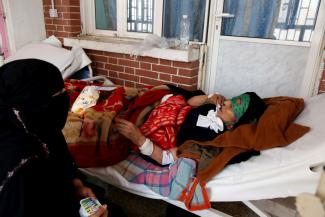Support pledges
Insufficient funding

In the course of the Covid-19 pandemic, humanitarian aid and development aid have been becoming ever more important. Especially countries torn by violent conflict, like Syria, Libya or Yemen, increasingly depend on international support. They were suffering from humanitarian crises even before the pandemic started.
Against this backdrop, the UN have launched the most comprehensive appeal for aid in its history. It wants to raise $ 10.3 billion for its Global Humanitarian Response Plan (GHRP). The pledges made by the international community, however, are still insufficient. This year, two international donor conferences fell significantly short of their funding targets. One concerned Syria and its neighbouring countries, the other Yemen. Due to a lack of funding, 30 of 41 UN aid programmes in Yemen already had to cut down or even discontinue their work since mid-April. In Syria too, many people in need are no longer being reached.
The novel coronavirus has also caused massive harm in developed countries, and their priority seems to be coping with the pandemic at home. Compared with Europe’s national and EU-level stimulus programmes, the support for developing countries looks quite scant.
Moreover, in some crisis regions, security concerns and geo-strategic considerations make it very hard to deliver aid. The UN Security Council’s painful compromise on the cross-border resolution on how to deliver relief supplies to Syria serves as a stark example. Due to the politically motivated voting behaviour by China and Russia, the number of border control points where aid can be delivered has been reduced, and it has become harder to provide people with the essential supplies their survival depends on. As for Libya, the urgent issues of finding a political solution to the conflict and enforcing the UN arms embargo are overshadowing aid considerations.
At the same time, we must bear in mind that the pandemic has considerably worsened pre-existing humanitarian crises in some conflict regions. In recent years and decades, progress was made in regard to fighting poverty and hunger as well as improving health care. That progress is now at risk of being reversed. Germany and the EU must rise to their responsibility.
The pandemic proves that, in our era of globalisation, problems require global solutions. Few events have made this truth as obvious as the spread of Covid-19. In terms of controlling the pandemic, the global community is only as strong as its weakest member. Accordingly, it also serves the self-interest of Germany and Europe to support weaker partners. Multilateral organisations serve an important coordinating function in the current situation, and their support is indispensable.
In spite of some shortcomings in this crisis, Germany and the EU clearly are among the world’s leading donors. Germany, in particular, has managed to quickly reallocate funds and mobilise additional resources. The EU, by contrast, is not making additional money available, but only reallocating existing budget items. Hopes for more funding for humanitarian aid and development cooperation in the EU’s multiannual financial framework for 2021 to 2027 have been disappointed. In this time of pandemic, it is essential that Germany and the EU display their solidarity with people in conflict countries by lending appropriately generous support.
Veronika Ertl is a policy adviser on development policy and works for the Konrad Adenauer Foundation, which is close to Germany’s Christian Democrats.
veronika.ertl@kas.de






